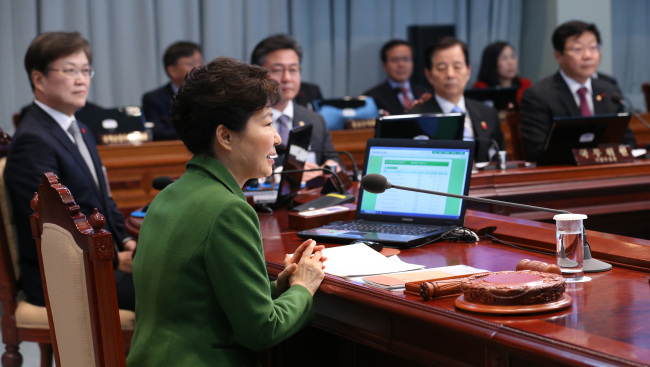President Park Geun-hye on Tuesday called for “strong and substantive” measures to punish North Korea’s fourth nuclear test, saying it would otherwise press ahead with additional experiments without facing the due consequences.
Presiding over a Cabinet meeting, she instructed her top foreign and security policy aides to make utmost efforts to convince the U.N. Security Council to draw powerful sanctions.
“If strong and substantive steps are not taken again this time, the international community would send the wrong signal to North Korea that should it carry out a fifth or sixth nuclear test, (the international community) can’t do anything about it,” Park said.
“We should make diplomatic efforts, closely cooperating with the U.S. and other partners primarily, so that the U.N. Security Council will come up with strong and comprehensive sanctions.”
Her reiteration of stricter penalties against Pyongyang, following her New Year’s news conference last week, came as the UNSC is working on a draft resolution in response to the communist state’s fourth underground explosion on Jan. 6.
South Korea, the U.S. and Japan have agreed to push for a strong and comprehensive response to North Korea‘s nuclear test, though it remains unclear whether China will join in tightening the screw on North Korea.
The roles of Beijing and Russia are crucial in particular, given their veto power at the council and decades-old diplomatic and economic patronage of Pyongyang that has long been deemed crucial for the Kim dynasty’s survival.
“We must make sure North Korea clearly recognizes what consequences its wrong behavior will bring,” Park said.
As part of the allies’ efforts to spur the diplomacy, U.S. Deputy Secretary of State Tony Blinken arrived here earlier in the day to coordinate a stance with Seoul before traveling to Beijing later in the week.
Hwang Joon-kook, South Korea’s special representative for Korean Peninsula affairs at Seoul’s Foreign Ministry and chief nuclear negotiator, also held talks with his Russian counterpart in Moscow.
While displaying concerns about Pyongyang’s nuclear program, Russian Foreign Minister Sergey Lavrov urged “restraint” and dialogue during his phone conversation with his South Korean counterpart Yun Byung-se last week, and Russian Ambassador to the U.N. Vitaly Churkin called for “cool heads” and a “proportionate response” ahead of an emergency UNSC session over the nuclear test on Jan. 6.
 |
| President Park Geun-hye presides over a Cabinet meeting at Cheong Wa Dae on Tuesday. Yonhap |
Park, meanwhile, also called on the military to maintain readiness against a possible North Korean provocation while asking the Cabinet to brace for any possible cyberattack from North Korea.
On Monday, South Korea said massive spam emails sent to its public organizations were traced to an Internet network in northeast China that Seoul said was behind a cyberattack on South Korea’s nuclear power operator in 2014.
The North has been linked to a series of cyberattacks on South Korea and the U.S. in recent years, though it has flatly denied any involvement.
By Shin Hyon-hee (heeshin@heraldcorp.com)

